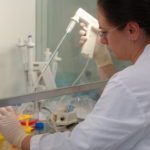
Gestational diabetes in pregnancy increases health risks
Women who have gestational diabetes mellitus (GDM) during pregnancy have a higher than usual risk of developing type 2 diabetes, hypertension, and ischemic heart disease in the future, according to new research led by the University of Birmingham. The University of Birmingham reports the retrospective cohort study, a collaboration between the Universities of Birmingham, Auckland, … Continue reading Gestational diabetes in pregnancy increases health risks

Testing blood after an accident could save lives
Scientists hope to have paved the way for the development of potentially new life saving treatments to be administered to seriously injured patients in the critical first hour of injury. The University of Birmingham reports, by testing the blood samples of ninety one people at the scene of major accidents, scientists were able for the … Continue reading Testing blood after an accident could save lives

Screening could prevent hip fractures in older women
Community screening for osteoporosis could prevent more than a quarter of hip fractures in older women, according to new research. The University of Birmingham reports a new study, published in The Lancet, has shown that a simple questionnaire, combined with bone mineral density measurements for some, would help identify those at risk of hip fracture. … Continue reading Screening could prevent hip fractures in older women

Inflammatory bowel disease rises with industrialisation
Countries in Africa, Asia, the Middle East and South America have seen a rise in incidence of inflammatory bowel disease as they have become increasingly industrialised and westernised, a new study has found. The research, a collaboration between the University of Birmingham, who reported on the study, the University of Calgary, and the Chinese University … Continue reading Inflammatory bowel disease rises with industrialisation

Lack of clinical trials for children with heart disease
Less than 1% of UK children born with congenital heart disease are enrolled in clinical trials looking to improve treatments, according to research funded by the British Heart Foundation and led by the University of Birmingham, who reported on the study, and Birmingham Children’s Hospital. The study, published in the European Journal of Cardio-Thoracic Surgery, … Continue reading Lack of clinical trials for children with heart disease

New research centre aims to minimise scarring
The University of Birmingham is to play a crucial role in the UK’s first ever specialist research centre aimed at minimising the impact of scarring among Armed Forces personnel and civilians wounded in terrorist and other attacks. The University of Birmingham reports the Scar Free Foundation Centre for Conflict Wound Research will be based at … Continue reading New research centre aims to minimise scarring

Breakthrough in live cell imaging
Research led by scientists at the University of Birmingham shows more precisely how G protein-coupled receptors, which are the key target of a large number of drugs, work. The human genome encodes hundreds of G protein-coupled receptors (GPCRs). These form the largest group of receptors through which hormones and neurotransmitters exert their functions on cells, … Continue reading Breakthrough in live cell imaging

New centre to help SMEs develop medical innovations
A new centre has been launched in collaboration with the University of Birmingham aimed at providing a central space for SMEs to accelerate the development of medical innovations. The University of Birmingham reports the Medical Devices Testing and Evaluation Centre (MD-TEC) is located in the Institute for Translational Medicine (ITM), a facility on the site … Continue reading New centre to help SMEs develop medical innovations

Trial to improve treatment for head and neck cancer
A clinical trial designed and co-ordinated by the University of Birmingham’s Cancer Research UK Clinical Trials Unit to test an experimental drug in patients with head and neck cancer has launched today through the Combinations Alliance, a joint initiative between Cancer Research UK and the Experimental Cancer Medicine Centres (ECMC) Network. The University of Birmingham … Continue reading Trial to improve treatment for head and neck cancer

People with PTSD respond differently to sounds
Scientists at the Universities of Birmingham and Amsterdam hope to have found a new neurobiological marker to help recognise patients with PTSD. Using an electroencephalogram (EEG), a test that detects electrical activity in a person’s brain via electrodes attached to their scalp, researchers studied the brain activity of a group of thirteen people with PTSD. … Continue reading People with PTSD respond differently to sounds








